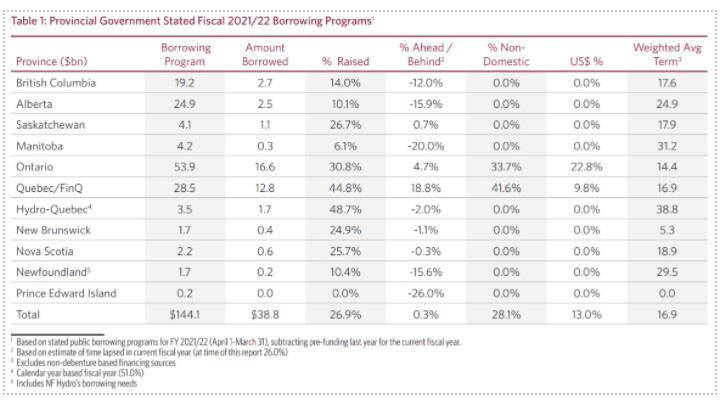
4 minute read
Reserve Funds – Refresher & Review of Pandemic Implications
CHARET CHAHAL, CFA
Prior to joining CIBC Wood Gundy, Charet worked in the oil and gas sector, developing a wealth of experience in energy markets. Charet also managed and led a start-up business venture to be listed on the public exchange. Charet is an avid supporter of the Calgary Children’s Hospital.
Advertisement
JAMES HOBSON, CFA
With over 10 years of experience at CIBC, James focuses on identifying major market themes, analyzing equity and fixed income securities, and monitoring client portfolios to ensure investment policy compliance. Among the numerous charities he assists, James is a long-time supporter and donor for the Kids Cancer Care Foundation of Alberta. JAMES HOBSON, CFA, PM, First Vice-President, Portfolio Manager, Investment Advistor & Chairman’s Council Member 403-260-0574 james.hobson@cibc.ca
CHARET CHAHAL, CIM, Portfolio Manager, Investment Advisor & Chairman’s Council Memeber 403-260-0440 charet.chahal@cibc.ca
This information, including any opinion, is based on various sources believed to be reliable, but its accuracy cannot be guaranteed and is subject to change. CIBC and CIBC World Markets Inc., their affiliates, directors, officers and employees may buy, sell, or hold a position in securities of a company mentioned herein, its affiliates or subsidiaries, and may also perform financial advisory services, investment banking or other services for, or have lending or other credit relationships with the same. CIBC World Markets Inc. and its representatives will receive sales commissions and/or a spread between bid and ask prices if you purchase, sell or hold the securities referred to above. © CIBC World Markets Inc. 2020. CIBC Wood Gundy is a division of CIBC World Markets Inc., a subsidiary of CIBC and a Member of the Canadian Investor Protection Fund and Investment Industry Regulatory Organization of Canada. James Hobson and Charet Chahal are Investment Advisors with CIBC Wood Gundy in Calgary The views of James Hobson and Charet Chahal do not necessarily reflect those of CIBC World Markets Inc. If you are currently a CIBC Wood Gundy client, please contact your Investment Advisor. Clients are advised to seek advice regarding their particular circumstances from their personal tax and legal advisors.

This article will briefly discuss the different types of reserve funds, how money in reserve funds can be used and the impact of the COVID-19 pandemic on reserve borrowing.
The Community Charter authorizes a council at their discretion to establish optional reserve funds for any specified purpose and mandates a council to establish certain reserve funds for purposes listed in the Community Charter. A council can set up optional reserve funds for any capital or operational expenditure by bylaw and can also set up policies for the funding sources and uses of the reserve funds. Those policies, however, cannot change the specified purpose of the reserve fund. The Community Charter obliges a council to establish a reserve fund for development cost charges (“DCCs”), park land, highway access to water, off-street parking and capital assets.1 Notwithstanding that these funds are statutory requirements, the reserve funds must be established through bylaw.
Money in a reserve fund, including the interest earned, must only be used for the purpose for which the fund was established.2 The Community Charter allows transfers between two reserve funds established for capital purposes; however, a transfer from a DCC or parkland acquisition reserve fund must be in a bylaw with ministerial approval.3 The municipality must repay the borrowed monies “no later than the time when the money is needed for the purposes of that [lending] reserve fund”.4
The Community Charter and Local Government Act prohibit borrowing from a reserve fund for operating purposes such as revenue anticipation borrowing or other similar forms of liquidity management. With that said, the COVID-19 pandemic has caused some adjustments to override the normal rule that capital reserves may only be used, even temporarily, for capital purposes.
1 Community Charter, SBC 2003, c 26, s. 188(2). 2 Ibid., s. 189. 3 Ibid., s. 189(5). 4 Ibid., s. 189(4.2). Ministerial Order 159 allowed municipalities, regional districts and improvement districts, in 2020, to borrow from reserve funds (interest-free) to cover an operational shortfall in 2020. No bylaw was required to authorize such a borrowing. Borrowed funds must be repaid, without interest, by December 31, 2025. Any amount unpaid after that time, must be added as a transfer to reserves under the 2026 financial plan (or budget or estimates) together with a 5% penalty.
On June 1, 2021, Bill 10-2021: Municipal Affairs Statutes Amendment Act, 2021, received its third reading. These changes will ensure extraordinary financial measures and corresponding repayment obligations under COVID Ministerial Order 159 will continue to have legal effect after its expiration date. Bill 10-2021 carries the language from Ministerial Order 159 (e.g., the five-year repayment of reserve fund borrowing) into a more permanent legislative framework. These changes aim to support local governments to recover from the challenges they faced during the COVID-19 pandemic and provide tools for local governments to respond to future special circumstances.
AMY O’CONNOR joined Young Anderson as an associate in June of 2019. She maintains a broad municipal law practice, with particular interests in freedom of information and privacy law.
ALEXANDRA GREENBERG has earned her LL.B with Honours and LL.M at the Taras Shevchenko National University of Kyiv. In 2020, she obtained her LL.M. (CL) at the Peter A. Allard School of Law at the University of British Columbia.







